Fairytales … Truer Than Real Life?
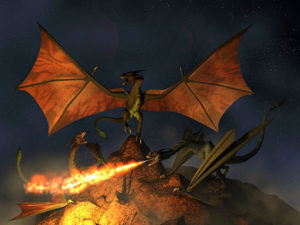 Escapist. Nonsensical. Childish. Delusional.
Escapist. Nonsensical. Childish. Delusional.
Those are the words that come to mind when many people think of reading fairytales and fantasy. Far-off worlds full of mythical creatures and over-blown heroism. Dragons, swords, magic, fairies, and epic battles. What could be further removed from reality . . . right?
For the longest time, when asked what I was reading, I would list off my most recent historical fiction or non-fiction read, and skip right over the fantasies and fairytale re-tellings that were my true favorites. What would people think if they knew a grown woman loved reading those types of books more anything else?
But one day I decided to take a close, honest look at my hesitancy, and I found that this tactic stemmed not from what others thought of me, but from the misguided embarrassment that I myself felt. As an inward person, an analyzer, the question I asked myself next came very naturally: Why do I love reading fantasy so much? And not only as an adult, but as a Christian?
I knew down deep the answer couldn’t really be what I feared–that my thoughts, emotions and tastes were childish. But if not, then what was the reason . . . the deeper reason?
In his book The Sandman, Neil Gaiman says, “Things need not have happened to be true. Tales and dreams are the shadow-truths that will endure when mere facts are dust and ashes, and forgot.”
Fairytales promote a desire for . . . other. Not a desire for fire-breathing dragons to terrorize your city block, or a desire for fantastical battles to happen on your front lawn, but a desire for “something beyond.” Children’s Christian fantasy writer and theologian C.S. Lewis argues that “this desire for something beyond does not empty the real world, but actually gives it new depths.”
Fantasy transforms our perception of reality. But what the best fantasy does, in my opinion, is to transform it into something truer, and more real, than it was to begin with. When I am immersed in a world of fairytale, its characters, its whimsy, its dangers and its heroes, I see each as a sort of echo from my own heart. An echo of the things I know to be good and pure and just and true and lovely from my own experience, from life itself, and even from God’s word.
Let’s imagine that you take a virtue such as bravery or love or forgiveness and wrap it in a shining fairy world. Go ahead–bury it deep within, mix its essence right into the story’s very structure and life. Now–give the story to someone whose heart has ignored that virtue, shelved it away in a dark, cobwebbed corner of her heart. She will plunge into the story, drawn in by its many facets and adventures. Then she will stumble, as if by accident, upon something – see something golden and true flit out of the corner of her eye.
And just like that, she’s found it–she’s found the hidden virtue, the truth beneath the illusion. And the finding of that one simple truth will be more amazing and delicious than if it been handed to her on a golden platter in broad daylight. When something is found in this way, and its unexpected whisper is heard through the pages of a story, the truth of it can resound stronger and further than a shout, or a sermon, or a real-world book with a supposed real-world message.
Fairytales and fantasy stories stand out in shocking relief from the dullness of life. The best and most thoughtfully told ones offer a new, bright way to discover something that our hearts have known all along. Maybe it’s a discovery of forgiveness, faith, or bravery. Maybe it’s seeing God in a brand new way.
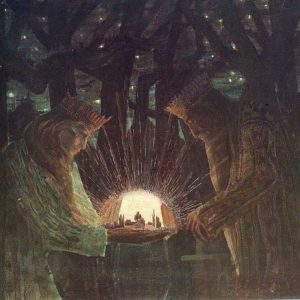 I have often felt, when reading fantasy (Christian fantasy even more so) that the story holds a light. For many years I felt that light was shining into the stories, showing me their secrets. Now I know that the light comes from the words of the stories themselves, and it shines outward, into me, if I allow it. A light that shows us new things is a wonderful thing. But a light that shows us the great things within ourselves that have been there, hiding in the dark, all along . . . now that’s a light I will go to some trouble to find.
I have often felt, when reading fantasy (Christian fantasy even more so) that the story holds a light. For many years I felt that light was shining into the stories, showing me their secrets. Now I know that the light comes from the words of the stories themselves, and it shines outward, into me, if I allow it. A light that shows us new things is a wonderful thing. But a light that shows us the great things within ourselves that have been there, hiding in the dark, all along . . . now that’s a light I will go to some trouble to find.
Jesus Himself told fairytales of a sort; the Bible calls them parables. He knew that sometimes a direct message falls on deaf ears or sinks and disappears into a jaded heart. He knew that the truth laid out flat is not always the path to true understanding and wisdom.
And He understood that a story, spun with imagination and deep meaning, can lead the lost home again.
I no longer worry when someone gives me an odd look after I confess to reading fairytales, or when I tell them I write fantasies. I just breathe a silent wish that they will one day see fairytales for what they truly are: not stories set apart from reality, but ways of taking life’s tired and faded truths and uncovering the vibrant colors hiding just beneath.
– – – – –
 Ashlee Willis is a writer of Christian fantasy for young adults. Her first book, to be published by Conquest Publishers, will be out within the next year. She is a mother, wife, and daughter of God. Among her favorite authors and greatest influencers as a child (and still!) are C.S. Lewis, Richard Llewellyn, George MacDonald, J.R.R. Tolkien, Joan Aiken, Mary Stewart, and Meredith Ann Pierce. When she isn’t writing, she can be found walking through the woods, catching bugs and frogs with her young son, or with her nose buried in a good book (a fairytale, of course!). She blogs about fantasies and fairytales at The True Fairytale. You can also find her on Twitter at @BookishAshlee.
Ashlee Willis is a writer of Christian fantasy for young adults. Her first book, to be published by Conquest Publishers, will be out within the next year. She is a mother, wife, and daughter of God. Among her favorite authors and greatest influencers as a child (and still!) are C.S. Lewis, Richard Llewellyn, George MacDonald, J.R.R. Tolkien, Joan Aiken, Mary Stewart, and Meredith Ann Pierce. When she isn’t writing, she can be found walking through the woods, catching bugs and frogs with her young son, or with her nose buried in a good book (a fairytale, of course!). She blogs about fantasies and fairytales at The True Fairytale. You can also find her on Twitter at @BookishAshlee.































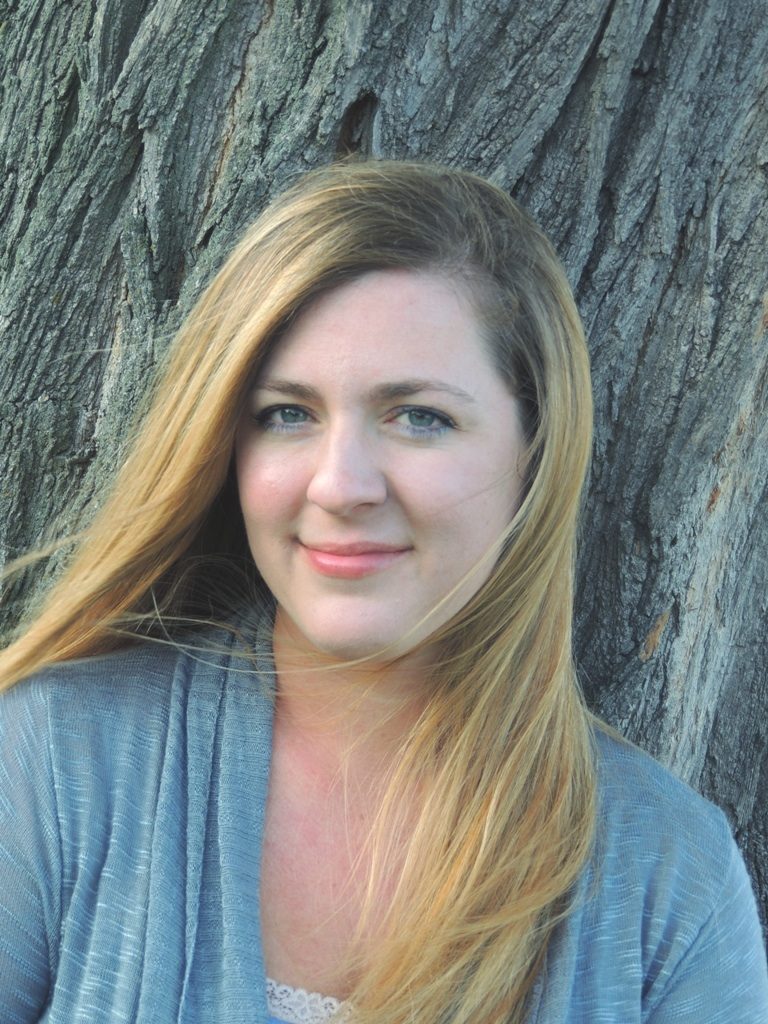


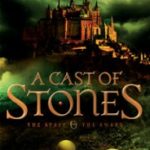
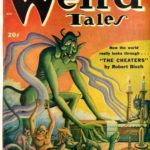




You might enjoy reading J.R.R. Tolkien’s essay “On Fairy Stories.” In it he talks about eucatastrophe.
I have read parts of it before, but need to read it in more depth. Thanks for the recommendation!
That’s why I write full-length fairy tales (The Gates of Heaven series). They can be a terrific vehicle to help readers learn about the God who loves them.
Yes, that’s why I write them as well. It’s such a wonderful and fulfilling thing to write in the genre I love and also be able to incorporate a meaning into my stories that goes beyond the earthly world. I just love it. I’m going to have to look up your series, Susanne!
Thanks, Ashlee. Book six, The Sands of Ethryn, comes out in January (ebook) and March (print) and was inspired by the epic poem “The Hound of Heaven” (I reenact it line by line), the book of Zechariah, and my favorite TNG Star Trek episode!
Well put, Ashlee!
(Perhaps someone could fix this post so it reflects your authorship at the beginning — I thought Becky had written it until I reached the credits at the end.)
Speaking of that sense of wonder, and the fantasy that is truer than the fact, I was just noticing afresh that the recent Avengers movies were done by a comic company named “Marvel”.
They are “the” big, classic name in comics, and I’ve taken the name for granted as representing a company. But it’s a word, a word that means to have a sense of wonder about something. To marvel. Because something is “marvelous”.
Marvel is a great word, I totally agree! Thanks for stopping by 🙂
Sorry about that, Teddi. Ever since the move to our new host, things have been a little wonky on the administrative side of Spec Faith (not as wonky as having the site shut down, though!) For some reason, on the public side, Ashlee’s name isn’t appearing as the author although on the administrative side it says she is. Go figure! If I’d realized this sooner, I would have added a line of introduction. Hopefully we’ll get the bugs out of the site soon.
Becky
Good article Ashlee. I have a question for you. What is the difference, if any, is there between fanatsy and fairytales?
To tell you the truth, they have both always merged in my mind, although I am sure there are exact differences.Julie makes a good point, though. Fantasies do tend to be more epic in nature than most fairy tales that I have read. Thanks for the interesting question! I might have to do some more research on that and write a blog post about it soon 🙂
If you don’t mind me stepping in. Classic fairy tales have a standard structure:
1. A person lives their normal life, commoner or prince.
2. Something happens to disrupt this life: maybe your parents abandon you in a forest, or you are cheated out of something, or what have you. It’s almost always from a wicked person.
3. The hero must endure fanciful or impossible trials to restore what was lost. She may be unable to speak a single word, be transformed into an animal, or do an onerous task.
4. The hero succeeds at the task after many failures.
5. The hero is either restored to their old status, or elevated. The wicked people are punished, often heartlessly so.
I think what Ashlee says about a virtue wrapped up in a story is right on the money, because there’s always some form of virtue that enables the hero in point 3. It may be a pagan virtue, like the courage to push a witch into an oven, but it’s there.
There’s modern Faerie tales, which I think is more about exploring the oddness and unearthliness of the idea of Faerie.
A good example of a Christian classic fairy tale can be found in George MacDonald’s short stories. The Light Princess is a good one. For a Christian Faerie tale, Tolkien’s Smith of Wootton Major.
Some great points! In my most recent blog post I talk about what I feel to be the differences between fantasy and fairytales. To be honest, it’s a hard thing to pin down!
I think fairy tales tend to have unnamed stock characters–“the youngest son, the evil queen” — and focus on small plots, while fantasy is more LOTR, with epic battles and such.
I think you’re right, Julie!
I love this! So well put.
This especially: “And just like that, she’s found it–she’s found the hidden virtue, the truth beneath the illusion. And the finding of that one simple truth will be more amazing and delicious than if it been handed to her on a golden platter in broad daylight.”
Thanks so much! I’m glad you enjoyed it 🙂
Good thoughts. Some echoing my own on the subject. My Reality Chronicles series is fairytaleish as well. And YA. So we have something in common.
Thanks! I’ve caught sight of your Reality series and it looks very intriguing! I’ll have to add them to my ever-growing to-be-read list! Just too many good books out there, and not enough time!!
I’d love to read a post about the differences between fantasy and fairy tales. However the turnout I’ll still be forced to tell people I read fantasy. I’m confident with my manhood but I dont want to give others reasons to question it.
Haha! Steve, that’s too funny – but I totally understand 🙂
“But what the best fantasy does, in my opinion, is to transform it into something truer, and more real, than it was to begin with.” Well said.
Thanks so much!
Great articles Ashlee. I love the quote by Neil Gaiman!
Thanks, Brent 😀